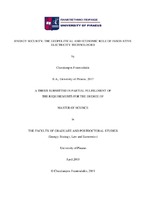| dc.contributor.advisor | Παραβάντης, Ιωάννης | |
| dc.contributor.author | Φουντουλάκης, Χαράλαμπος | |
| dc.contributor.author | Fountoulakis, Charalampos | |
| dc.date.accessioned | 2019-06-20T05:35:52Z | |
| dc.date.available | 2019-06-20T05:35:52Z | |
| dc.date.issued | 2019-04-08 | |
| dc.identifier.uri | https://dione.lib.unipi.gr/xmlui/handle/unipi/12035 | |
| dc.format.extent | 61 | el |
| dc.language.iso | en | el |
| dc.publisher | Πανεπιστήμιο Πειραιώς | el |
| dc.rights | Attribution-NonCommercial-NoDerivatives 4.0 Διεθνές | * |
| dc.rights.uri | http://creativecommons.org/licenses/by-nc-nd/4.0/ | * |
| dc.title | Energy security: the geopolitical and economic role of innovative electricity technologies | el |
| dc.type | Master Thesis | el |
| dc.contributor.department | Σχολή Οικονομικών, Επιχειρηματικών και Διεθνών Σπουδών. Τμήμα Διεθνών και Ευρωπαϊκών Σπουδών | el |
| dc.description.abstractEN | The objective of the study presented in this thesis is to highlight the impact that breakthrough technologies in the electricity sector can have on energy security, under the scope of geopolitics and energy economics. The research is carried out on the axis of renewable and smart grid technologies, being critical components of a worldwide energy transformation which implies major geopolitical rearrangements in the medium to long term, as well as structural alterations in national electricity markets. An inductive qualitative grounded analysis is conducted, based on the simultaneous collection and interpretation of secondary data from heterogeneous academic sources, in order to adequately correspond to the multidimensional nature of the aforementioned research topics. This methodology produces intriguing conclusions regarding the future structure of the international system, with the emergence of new important players and others facing the challenge of internal destabilization, recession and geopolitical degradation unless they adapt their economies to the suggested energy paradigm. It also highlights the multiple benefits of the energy transition for the energy security of the developed countries, as well as the unique opportunities that it entails for countries with high energy poverty indexes in sub-Saharan Africa to upgrade their electrification status and advance with leaps and bounds towards achieving their sustainable development goals. | el |
| dc.contributor.master | Ενέργεια: Στρατηγική, Δίκαιο & Οικονομία | el |
| dc.subject.keyword | Τechnological innovation | el |
| dc.subject.keyword | Renewable energy | el |
| dc.subject.keyword | Distributed energy resources | el |
| dc.subject.keyword | Smart grids | el |
| dc.subject.keyword | Energy geopolitics | el |
| dc.subject.keyword | Affordability | el |
| dc.subject.keyword | Electrification | el |
| dc.subject.keyword | Energy security | el |
| dc.subject.keyword | Energy transition | el |
| dc.date.defense | 2019-04-12 | |



